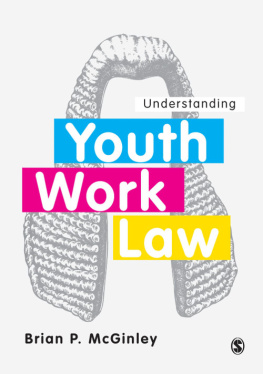Understanding & Using Research in Social Work
SAGE was founded in 1965 by Sara Miller McCune to support the dissemination of usable knowledge by publishing innovative and high-quality research and teaching content. Today, we publish more than 850 journals, including those of more than 300 learned societies, more than 800 new books per year, and a growing range of library products including archives, data, case studies, reports, and video. SAGE remains majority-owned by our founder, and after Sara's lifetime will become owned by a charitable trust that secures our continued independence.
Los Angeles | London | New Delhi | Singapore | Washington DC
Understanding & Using Research in Social Work
- Brian J. Taylor
- Campbell Killick
- Anne McGlade
Learning Matters
An imprint of SAGE Publications Ltd
1 Oliver's Yard
55 City Road
London EC1Y 1SP
SAGE Publications Inc.
2455 Teller Road
Thousand Oaks, California 91320
SAGE Publications India Pvt Ltd
B 1/I 1 Mohan Cooperative Industrial Area
Mathura Road
New Delhi 110 044
SAGE Publications Asia-Pacific Pte Ltd
3 Church Street
#10-04 Samsung Hub
Singapore 049483
2015 Brian Taylor, Campbell Killick, Anne McGlade
First published in 2015
Apart from any fair dealing for the purposes of research or private study, or criticism or review, as permitted under the Copyright, Designs and Patents Act, 1988, this publication may be reproduced, stored or transmitted in any form, or by any means, only with the prior permission in writing of the publishers, or in the case of reprographic reproduction, in accordance with the terms of licences issued by the Copyright Licensing Agency. Enquiries concerning reproduction outside those terms should be sent to the publishers.
Library of Congress Control Number: 2015946647
British Library Cataloguing in Publication Data
A catalogue record for this book is available from the British Library
ISBN: 978-1-4739-0814-7 (pbk)
ISBN: 978-1-4739-0813-0 (hbk)
Editor: Kate Wharton
Development editor: Lauren Simpson
Production editor: Chris Marke
Copy editor: Diana Chambers
Proofreader: Sue Edwards
Marketing manager: Tamara Navaratnam
Cover design: Wendy Scott
Typeset by: C&M Digitals (P) Ltd, Chennai, India
Printed in Great Britain by Henry Ling Limited at The Dorset Press, Dorchester, DT1 1HD
About the Authors
Brian Tayloris Professor of Social Work at Ulster University in Northern Ireland where he has the lead role for research in social work. He spent ten years in practice and fifteen years in professional training and organisation development in social work before moving to the university. He teaches research methods to Ph.D. students and to experienced social workers undertaking postgraduate, post-qualifying study. He was module coordinator for an innovative Introduction to Evidence Based Practice module on the B.Sc. qualifying social work programme. Brian leads the university social work research cluster on Decision, Assessment, Risk and Evidence Studies and is the primary organiser of a biennial international symposium on this topic. He was a member of the Cross-Border Child Protection Research and Knowledge Transfer Sub-Committee of the NorthSouth Ministerial Council for the island of Ireland. Brian is an honorary Senior Fellow of the School for Social Care Research of the National Institute for Health Research, London.Campbell Killickis employed as a Research Officer (Social Work) within a Health and Social Care Trust in Northern Ireland. This innovative post allows him to support practitioners to use research findings and participate in research activity. Campbell's social work background includes disability and mental health, and he is involved in training relating to the safeguarding of adults and children. Campbell's Ph.D. was on the topic of professional decision making in adult protection, and his research interests include professional decision making, assessment processes and the use of evidence in practice.Anne Gladehas been Social Care Research Lead for the Social Care and Children's Directorate, Health and Social Care Board since October 2013. She is the lead on the development of the Research and Continuous Improvement Strategy (20152020) In Pursuit of Excellence in Evidence Informed Social Work Services in Northern Ireland. She has a long-standing career working in research and evaluation research in health and social care and other settings in England and Northern Ireland. She has a keen interest in the needs of older people, people with disabilities and people from black and minority ethnic groups. She has undertaken and published a range of research studies in these areas. Her interest in equality and human rights led to a career spanning a number of years as an adviser to a range of health and social care organisations.She is also a visiting lecturer and co-tutor on two post-qualifying programmes for social workers at Ulster University: the Application of Research Methods in Social Work and the Evidence Informed Professional and Organisation.
Acknowledgements
We would like to thank Janice McQuilkin, Joanne Knox (Assistant Librarians) and Niall Burns (Librarian) at Ulster University, who have worked with us over the past decade and have helped hundreds of social work students to develop knowledge and skills in retrieving research relevant to social work topics. We would like to thank the undergraduate (qualifying programme) and postgraduate (post-qualifying programme) social work students for their collaboration in road testing various ideas and materials contained here. In particular, we would like to thank the experienced social workers who have undertaken the Research Methods Programme, post-qualifying M.Sc. dissertation module provided by Ulster University and employer partners, and also our fellow tutors and practice assessors on this programme. Their experiences and reflections have greatly enriched our understanding. Thanks to Mabel Stevenson, Research Assistant at Ulster University who so willingly assisted with some visual material and tidying references.
Chapter 1 Introduction
This introductory chapter outlines the context in which this book has been written in terms of the audience, the profession and the experience of the authors. It identifies the need for the book in its policy and service context. This introduction outlines the chapters of the book and how they are sequenced and relate to each other, and concludes with notes on terminology and the scope of the book.
In an increasingly information-rich society we all as citizens, as providers of services and as users of services need skills to evaluate the data and knowledge available to us. This challenge applies particularly to the understanding and use of research by professionals the focus of this book. Although there is a challenge in undertaking worthwhile and robust research in social work, this book focuses on the wider challenge that faces a much larger number of professionals namely, understanding and using research to inform practice rather than undertaking research. What is required by all professionals is an ability to confidently shape a question that might be answered by research, identify relevant studies to address the question and have some idea about appraising the quality of that research. Professionals need skills in synthesising studies and presenting this summary coherently to colleagues in terms of its implications for their practice. In short, all social workers like all other professionals require the knowledge and skills necessary to be evidence-informed professionals and to participate in evidence-informed organisations. That is the focus of this book.








